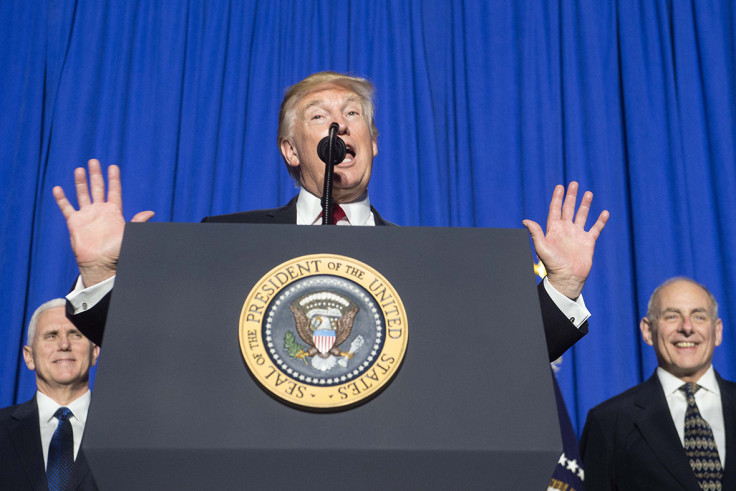Google recall staff outside US in wake of Donald Trump's ban from Muslim countries
Trump's executive order means that thousands of US residents may not be allowed entry to US.
American tech giant Google has recalled staff who are travelling outside the US, after US President Donald Trump made an executive order restricting entry for nationals of seven countries in which the population is primarily Muslims.
Trump's order, passed on Friday (27 January), means citizens from Iran, Iraq, Syria, Yemen, Sudan, Somalia and Libya may not enter the US, and may not be allowed to board planes flights heading for the country.
Trump signed the 'extreme vetting' executive order prohibiting entry by people from the above countries for 90 days, while the government revises the security checks used when granting visas.
The order also suspends the US Refugee Admissions Program for 120 days. Citizens from the above countries, including Syria, are also effected.
The order, Trump says, is to "keep radical Islamic terrorists out of the US", but Google said it is detrimental to the company, as more than 100 staff are affected by the order.
The tech giant has often expressed its belief that restrictions on immigration could block the world's best talent from working in the US.
"It's painful to see the personal cost of this executive order on our colleagues," Sundar Pichai, Google's chief executive, wrote in the memo, which was seen by Bloomberg News. "We've always made our view on immigration issues known publicly and will continue to do so."
I promise that our administration will ALWAYS have your back. We will ALWAYS be with you! pic.twitter.com/D0aOWhOH4X
— Donald J. Trump (@realDonaldTrump) January 27, 2017
Trump signed the order, entitled Protection Of The Nation From Foreign Terrorist Entry Into The United States, that says: "I hereby proclaim that the entry of nationals of Syria as refugees is detrimental to the interests of the United States and thus suspend any such entry".
"I am establishing new vetting measures to keep radical Islamic terrorists out of the United States of America," Trump said according to CNN, during the signing at the Pentagon after Defense Secretary James Mattis was sworn in.
"We don't want them here," Trump added.
Trump order begins by invoking 9/11 three times
— Bradd Jaffy (@BraddJaffy) January 28, 2017
9/11 hijackers were from Egypt, Saudi Arabia, UAE & Lebanon
None of those countries banned pic.twitter.com/WaRyiBZ1S0
The Arab-American Anti-Discrimination Committee said the order appeared to affect people that hold a so-called green card, which allows immigrants to reside permanently and work in the US.And people took to social media to claim friends had been turned away.
People took to social media to claim friends had been turned away.
A friend from Iran left the US on a business trip and now CAN'T come back. His family -- wife & kids -- are now by themselves in the US.
— André L. Souza (@andrelesouza) January 27, 2017
Let this sink in. There are green card holders who may have lived here for years, who upon returning home to US today we're refused reentry
— Trita Parsi (@tparsi) January 28, 2017
The Department of Homeland Security issued the directive at 4.30pm (Eastern Time Zone), ordering the Customs and Border Protection to enforce the executive order hours before the text was released in public. However, the order wasn't publically announced until 7pm.
In response to the order, the Council on American-Islamic Relations says they plan to file a lawsuit and advised nationals from the seven affected countries living in the US not to travel abroad, for fear that they will not be re-admitted.
According to the New York Times, legal complaints related to Trump's travel ban have also been filed by American Civil Liberties Union; the International Refugee Assistance Project, a human rights pressure group which provides legal services; National Immigration Law Center, which campaigns for and defends civil rights for immigrants; Yale Law School's Jerome N Frank Legal Services Organization, which provides pro bono legal counsel for US residents; and the international law firm Kilpatrick Townsend & Stockton.
In Silicon Valley, Facebook founder Mark Zuckerberg posted a lengthy note on the social media network, saying he was "concerned" about President Trump's executive orders and that he was the descendant of immigrants.

The BBC has reported that Trump's measures include:
- Banning entry from refugees from Syria until "significant changes" are made,
- 90-day suspension on arrivals from Iraq, Syria, Iran, Libya, Somalia, Sudan, and Yemen (except certain visa categories such as diplomats), and
- a cap of 50,000 refugees in 2017 - less than the 110,000 upper limit imposed by former President Obama.
The order also allows for priority for future refugee applications from those persecuted for their religion.
In a TV interview broadcast earlier on Friday, the president said that Syrian Christians would be given priority among people who apply for refugee status from the country in the future.

© Copyright IBTimes 2025. All rights reserved.






















